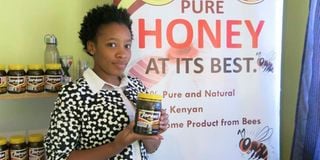I started my honey processing business from my pocket money

Joreen Kinyua, the founder of Joreen honey, a company that aggregates, produces, supplies and sells organic honey while offering training to farmers and general public on beekeeping.
What you need to know:
- Before investing in the business, Joreen Kinyua studied beekeeping and how to process honey at KIRDI.
- The launch of the business coincided with the arrival of Covid-19 in Kenya, a factor that increased the demand for honey.
For as long as she can remember, Joreen Kinyua and her family have been regular consumers of honey.
However, they would often get low quality or adulterated honey, which was discouraging since they are health conscious and would end up throwing away the honey, losing money in the process.
But this also opened her eyes to the business opportunity that lay in honey, but before investing in the business, she studied beekeeping and how to process honey at the Kenya Industrial Research and Development Institute (KIRDI). After the training, she founded Joreen Honey in 2019, a business that aggregates, produces, and sells organic honey while training upcoming beekeepers.
“We charge Sh1,000 for training, which is an affordable fee to most people keen on learning apiculture,” says Joreen.
The company began operations in March 2020 to a good start. The opening of the company coincided with the arrival of Covid-19 in Kenya, a factor that increased the demand for honey as many consumers used it to sweeten the ginger, garlic and lemon drink locally known as ‘dawa’.
She started her business with a capital of Sh150,000 from savings from her college allowance. Now she makes up to Sh400,000 in profits on a good month.
Her business has grown to employ a team of 10, who assist with the aggregation, sourcing, production, packaging, labeling and distribution of the honey. She sources it from Baringo, West Pokot, Nanyuki, Laikipia, Meru, Embu and also from Tanzania and Uganda.
The 24-year-old entrepreneur sells her brand of honey in bulk and in retail.
Biggest challenge
“For bulk orders, a kilo costs Sh350 with a minimum quantity order of 1 ton, while for retail, 500g costs Sh350,” says Joreen.
"We test our honey during aggregation to ensure that it is pure. The chemical tested on pure honey retains its brown colour, but if adulterated, the chemical turns orange. We test every honey that we buy to ensure that we sell quality."
After testing the honey for any adulteration or addition of commercial sugars, they then transport the honey to KIRDI where it is pressed, filtered, processed or refined. The honey is packaged in smaller quantities and then labeled, ready for sale to the retail market.
“The distributor and our sales agents later on take the product to the market and sell to retail stores, mini markets and individuals. We are able to produce a minimum of three tons of honey per month.”
But business has not been a smooth ride for her. The biggest challenge she encounters is during aggregation, since most of the honey she receives from farmers is adulterated.
“The demand for honey surpasses the supply, so many try to increase capacity by adulteration, there is also the fact that honey is seasonal, besides, aggregation is expensive – logistically, you tend to use a lot of resources to aggregate a small amount of honey, leading to inconsistent pricing and sometimes very small profit margins,” she explains.

Besides honey, Joreen Kinyua also produces peanut butter and herbal tea.
Commenting on the growth of her market and rising sales, she says that consistently providing quality honey has led to many referrals, in the process growing her clientele base. Social media has also played a major role in marketing her honey. She says that her goal is to fully penetrate the retail market.
“We have been approved by the Kenya Bureau of Standards, therefore we are able to sell and distribute our products all over East Africa,” she says.
Joreen, a hotelier and chef by profession, has won several awards - she is a youth of the year awardee in the top 35 under 35 youths in Kenya under the entrepreneurship category, FOYA Global under the manufacturing category, and has been nominated in the Zuri awards 2021 under the entrepreneurship and agriculture categories.
“I am very passionate about youth empowerment and empowering farmers in the rural areas to promote sustainable farming practices with no implications to the natural environment.”
Her brand is available on their website joreenbrands.com and online platforms such as Jumia, Sendy, Pessafy, Kilimall.
“We are looking forward to supplying the East African market by end of next year as well as to increase our capacity to be able to export honey to the Middle East markets in the next two years,” she says, adding that this will be possible when Kenyans start practicing beekeeping as a serious commercial venture.





